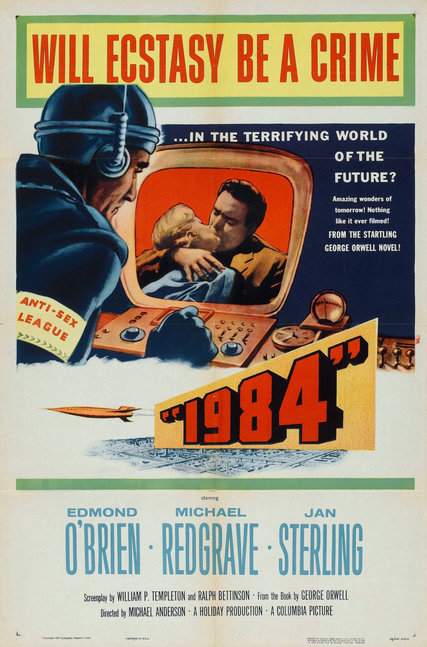SOURCE: New York Times
By JENNIFER SCHUESSLERJUNE 15, 2017
The stage adaptation of “1984” opening on Thursday, June 22, may be George Orwell’s Broadway debut. But his novel — and coinages like Big Brother, thought police and double-think — have never been far from the cultural stage. Here’s a partial history of the prophetic year that somehow never passes into the past.
[Read about “1984” coming to Broadway.]
A Star Is Born
The novel, published in 1949, sold well, but it took the “telescreen,” as Orwell might have put it, to inject its nightmare vision into the cultural bloodstream. A TV adaptation aired in the United States in 1953, followed the next year by a BBC version seen by seven million people, many of whom seemed to have the bejesus scared out of them.
The show opened with the image of a mushroom cloud and a warning that it was “unsuitable for children or those with weak nerves.” The next day, The Daily Express reported a casualty under the front-page headline “1984: Wife Dies as She Watches.” The BBC was flooded with complaints, and the British Housewives’ League denounced it as “sadistic and horrible.”
It had the lasting effect of turning Orwell’s shadowy villain into a celebrity. “The term Big Brother, which the day before yesterday meant nothing to 99 percent of the population,” The Times of London reported, “has become a household phrase.”
A Propaganda Tool
While Orwell was a man of the left, the novel was seized on as a useful cultural weapon against the Soviet Union. The Time-Life publisher Henry Luce promoted it in his magazines. And the Central Intelligence Agency, which had financed an animated film version of Orwell’s “Animal Farm,” also took an interest in “1984.”
The agency helped fund the 1956 British film version, starring Edmond O’Brien, Michael Redgrave and Jan Sterling, while the executive director of the American Committee for Cultural Freedom — an affiliate of the C.I.A.-backed Congress for Cultural Freedom — worked behind the scenes to alter Orwell’s bleak ending. The novel ends with Winston Smith’s total submission, but the British version of the film shows him being gunned down after shouting “Down with Big Brother!” The Orwell estate later withdrew the film from circulation.
CRITIC’S NOTEBOOK
Why ‘1984’ Is a 2017 Must-Read JAN. 26, 2017
Big Brother, Ourselves?
By the 1960s, Winston’s struggle was seen as against the dehumanization inherent in modern society itself. In an influential afterword written in 1961 (and still included in contemporary editions), the psychologist Erich Fromm called it a warning that “unless the course of history changes, men all over the world will lose their most human qualities, will become soulless automatons and will not even be aware of it.”
Dystopian echoes of the novel appeared in Anthony Burgess’s “A Clockwork Orange,” published in 1962, and the British television series “The Prisoner,” which began airing in 1967, but the Orwell estate kept a lid on outré direct adaptations, including a musical version by David Bowie.
Orwell’s widow and executor, Sonia, reportedly found the idea in poor taste and blocked it, but Mr. Bowie did write several songs loosely inspired by the novel, including “Big Brother” and “1984,” and in 1973 presented a television special with the punning title “The 1980 Floor Show.”
Party Like It’s 1984
As 1984 itself approached, the news media ran numerous articles comparing Orwell’s vision to reality. Shortly after the year arrived, the Soviet political journal New Times issued its own propaganda strike, in an article charging that Orwell’s vision had come true — “in the United States, under a ‘Big Brother’ named Ronald Reagan.”
During the Super Bowl, Apple aired its memorable (and much parodied) “1984” commercial, directed by Ridley Scott. And a movie version of the novel, directed by Michael Radford, was rushed into production.
In a recent video interview, Mr. Radford recalled filming the novel’s Two Minutes Hate — a mass ritual denouncing the regime’s enemies — with hundreds of extras. “Each time we did a take, three or four or sometimes 10 people would faint and go hysterical,” he said.
Irony alert: The decommissioned Battersea Power Station in London, which doubled as the facade of the grim Victory Mansions apartment complex in the movie, is currently being transformed into a $17 billion development whose tenants include the new British headquarters for Apple.
Surveillance Is Fun
Orwell’s vision of a world of total surveillance may have had its fullest, if most ambiguous, realization in reality TV. “Big Brother” and its spinoffs survived a copyright challenge in 2000 from the owner of the film rights to the novel, and has survived to provide memorable moments, including in November 2016, when contestants on “Big Brother Over the Top” emerged from sequestration to learn Donald J. Trump had been elected president.
In the second-time-as-farce department, the novel’s infamous torture chamber, Room 101, where victims confront the thing they fear most, has lent its name to a British comedy show in which celebrities discuss their pet peeves. Boris Johnson has inveighed against, among other things, boiled eggs and “hysteria about passive smoking.”
Enough Already?
With the “1984” boom has come something of a backlash. “The last few months have been hard, no doubt, the news more distressing by the hour,” the novelist and critic Siddhartha Deb wrote in The New York Times Book Review in February, “but there is still something perversely groupthinkish in the fact that the impulse of resistance has homed in on the same book.”
A version of this article appears in print on June 18, 2017, on Page AR7 of the New York edition with the headline: Dystopia Down the Decades.


